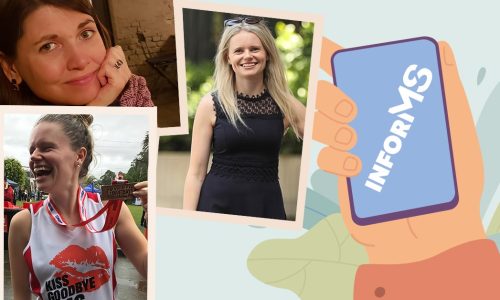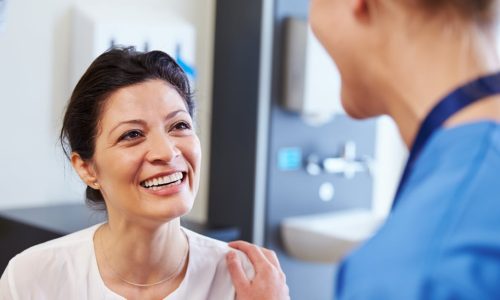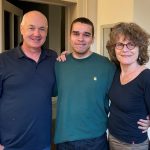- The MS Australia Progress in MS Research Scientific Conference was recently held in Hobart.
- Over 180 MS researchers, clinicians and allied healthcare professionals met to discuss their latest findings in MS and form research collaborations.
- The main themes of the conference included digital research, lifestyle factors, imaging and innate immunity.
On 4th and 5th April, MS researchers, MS nurses, clinicians and allied health professionals gathered in Hobart to discuss their latest work and most exciting findings.
This was our eighth Progress in MS Research Scientific Conference, with close to 50 oral presentations and over 80 poster presentations, making this one of our largest scientific programs ever.
The conference is designed to help boost collaborations and stimulate innovative research into the causes, prevention, improved treatments and ultimately cures for MS. These are ambitious goals and to achieve this we need to collaborate and work together. As Steve Jobs said, “great things in business are never done by one person, they’re done by a team of people”. The delegates at the conference truly embraced this notion and there was a high level of exchange of scientific thought and investigation among neurologists, researchers and allied healthcare professionals.
In addition to the 180+ Australian scientists, we had three fantastic international experts from the US and Switzerland who shared their research.
The main themes of the conference were:
- Digital Research (digital biomarkers, virtual clinics, digital labs)
- Lifestyle Factors
- Imaging
- Innate Immunity
However, many other fascinating and important research developments were shared across diverse fields including autologous haematopoietic stem cell therapy (AHSCT), cognitive behavioural therapy, repair of the damaged myelin sheath in MS, and more.
Digital research
Advances in technology are providing amazing new tools to allow researchers to see even the most subtle changes in MS. From computerised tests to wearable sensors to artificial intelligence (AI), all are paving the way towards improved clinical care.
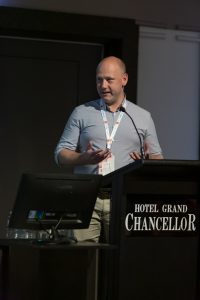
Dr Daniel Merlo
Dr Daniel Merlo from Monash University presented his latest work on how long-term worsening of reaction time detected by a computerised test can predict disability progression. Most cognitive (thinking and memory) tests used in the clinic are not suitable for routine use due to the length of time required to complete them. The computerised test that Dr Merlo presented only takes ten minutes and can be completed at home or in the clinic. Using a specific model, he was able to classify test participants into specific groups based on their change in reaction time. Using this model, he identified a group of participants with relapsing remitting MS who were likely to experience continued reaction time worsening and a group who had an increased probability of confirmed disability progression. The development and validation of these tests could provide their neurologists with more information to make better mutual clinical care decisions. This test could also be an important biological marker in clinical trials of new medications for progressive MS, which are urgently needed to accelerate and enable trials for this MS type.
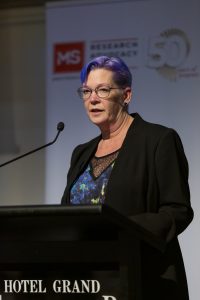
Dr Maya Panisset
Dr Maya Panisset from the University of Melbourne talked us through her research on using wearable sensors to measure walking stability. There are many measures of walking stability, such as the timed walk, but these cannot detect specific aspects of walking that are affected in MS, nor measure subtle changes. Her latest research shows that wearable sensors could distinguish between people with MS and those without MS, and that placement of wearable sensors on the chest was more sensitive to subtle changes in walking stability than placement on the lower back. This work demonstrates the potential capacity of wearable sensors to be used as a digital biomarker for detection of early functional changes in MS and could potentially be used to monitor disease via a smart phone.
Lifestyle factors
Lifestyle factors are aspects of life that can influence MS disease progression and disability, such as diet, exercise, gut health, or smoking. We know that this is an area of importance to the MS community as it provides a mechanism for people with MS to take control and potentially minimise the impact of MS on their lives. While there is evidence that these factors can affect disease course, this area of research is a complex one with so many variables to be considered.
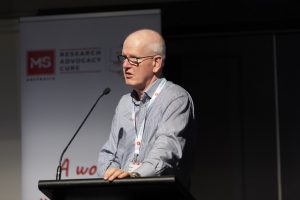
Professor Bruce Taylor
Professor Bruce Taylor from the Menzies Institute for Medical Research presented his work on the prevalence of MS in the greater Hobart region and how this has changed over time. Hobart has the highest level of MS in Australia, and there is a latitude gradient of MS incidence observed in Australia as in other parts of the world, such that the percentage of people with MS is higher the further people live from the equator. This is likely due to lesser exposure to UV radiation and/or the associated vitamin D availability. Professor Taylor’s work shows that the incidence and prevalence of MS has increased over the years in the greater Hobart region. It is possible that lifestyle factors may have caused this shift, such as obesity, smoking, use of sunscreen (reducing UV exposure) or reduced numbers of or later pregnancies, but this requires further investigation.
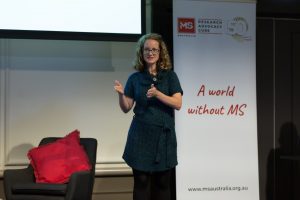
Associate Professor Yasmine Probst
Associate Professor Yasmine Probst from the University of Wollongong presented an overview of the current state of play in nutrition in MS and provided advice to healthcare professionals to help guide their response to these diets. Currently, there is no single recommended diet proven in MS to prevent or slow progression, and although some nutrients may influence the immune system, nothing is absolute. Associate Professor Probst highlighted that that everyone is different and has an individual gut microbiome, and as such there is no single “quick-fix” for everyone. The only diet recommendation at this stage is to follow the Australian Dietary Guidelines.
Imaging
Development of cutting-edge technologies for imaging the brain has provided new insights into MS and has helped with the development of biomarkers for disease diagnosis and monitoring.
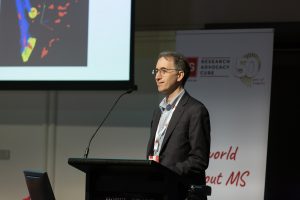
Professor Michael Barnett
Professor Michael Barnett from the University of Sydney presented his exciting research on the use of MRI coupled with AI to try and get a complete picture of what is happening in the brain of people living with MS. Traditionally counting the number of lesions on an MRI scan would give us an idea of progression but Professor Barnett spoke about how slowly expanding lesions may impact the health of people living with MS and may potentially be the driver of progression. The slow expansion of lesions can be quite difficult to detect between two time points, but using specialised imaging and AI over multiple time points, the team has developed a method for measuring this. In fact, these slowly expanding lesions may correlate with loss of brain volume and disability progression. It is hoped these measures can be deployed in the clinic and tracked in MSBase, an international database of MS clinical outcomes.
Innate Immunity
Another important area of focus was innate immunity, the first line of defense of our immune system. This appears to be an important role in the development and progression of MS.
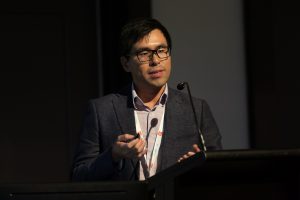
Dr Wei Yeh
Dr Wei Yeh from Monash University presented his work on the effect of vitamin D supplements on the immune system in people who have experienced a first demyelinating event. Vitamin D deficiency is a risk factor for MS, with vitamin D thought to dampen the immune response. Dr Yeh has found that three months of high dose vitamin D supplementation caused various genes to be turned on or off in immune cells, as well as changes to various biological processes. Dr Yeh also found this to be dependent on the dose of vitamin D. These results provide insight into the effect of vitamin D on the immune system in people who are yet to be diagnosed with MS and may inform future vitamin supplementation studies.
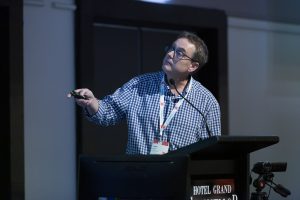
Mr Jason Turner
Mr Jason Turner from the University of Tasmania talked about the link between the immune system and social cognitive difficulties. Social cognition refers to the processing of social information, such as the ability to recognise facial emotions. Mr Turner looked at the link between several proteins of the immune system that promote or reduce inflammation and social cognition functioning in people living with MS. He found higher levels of immune system proteins that promote inflammation was associated with poorer social cognitive function in people living with MS. The opposite was also true in that anti-inflammatory immune system proteins were associated with better social cognitive functioning. Overall, this research showed that disease inflammatory processes, distinct from the inflammation that occurs during relapses, may partly be a driver of the difficulties in social cognitive abilities in people living with MS.
Involvement of people living with MS
We know that involvement of people living with MS in research is absolutely vital and it was wonderful to hear about this from someone who has had first-hand experience. Ms Katrina Chisholm, who lives with MS and is part of the Our Health in Our Hands initiative at the Australian National University, presented her experience of being a person living with MS involved in MS research. People living with MS involved in research contributed to research question development, data analysis, preparation of peer reviewed papers, creation of a toolkit for collaboration between people living with MS and researchers, and production of conference presentations. People with MS felt supported and that their contributions were valued throughout this experience. Ms Chisholm explained that being involved in research can be empowering and provide a meaningful way to contribute to both the research community and the broader MS community.
Live Update
Following on from the first two days of the conference, the Live Update took place on the final day where people could hear directly from the experts on the progress of global MS research in real-time. Topics discussed included MS gene hunting, rewrapping nerve fibres, how MS Nurses improve the lives of people living with MS as well as a Neurologist’s insight. You can watch the Live Update on demand here.
Beyond the conference
It was fantastic to finally see researchers, clinicians and allied health professionals presenting their latest research and networking face-to-face after delays due to the pandemic. To see such dedication, commitment and quality of the researchers in the room was amazing. Additionally, there were many young up-and-coming researchers presenting world-class work, a clear indication that MS research in Australia is only going to continue from strength to strength.

